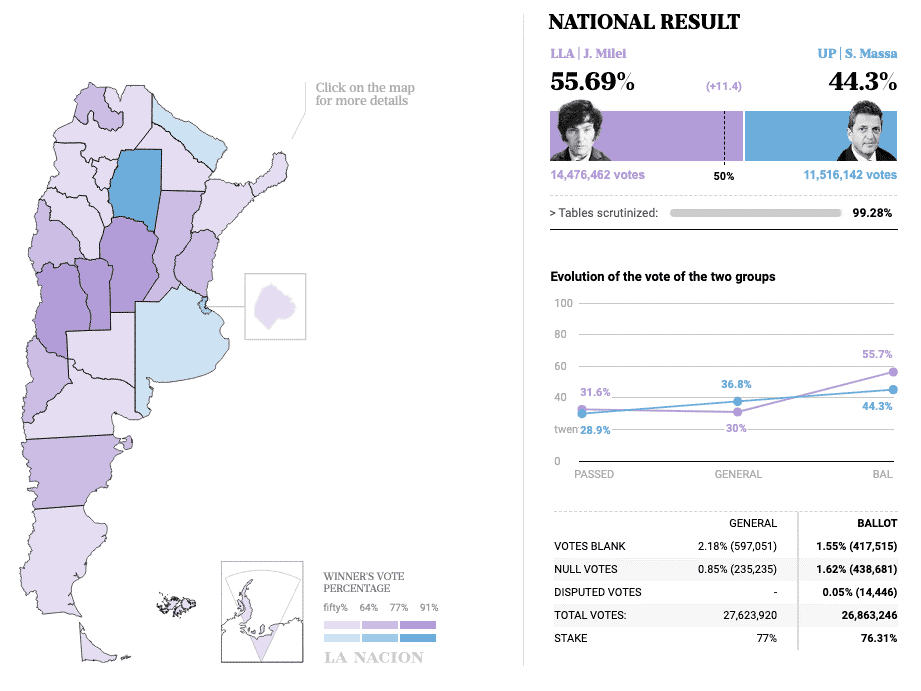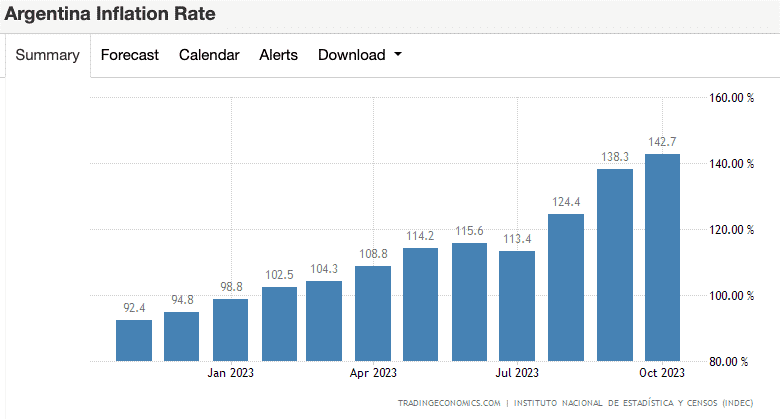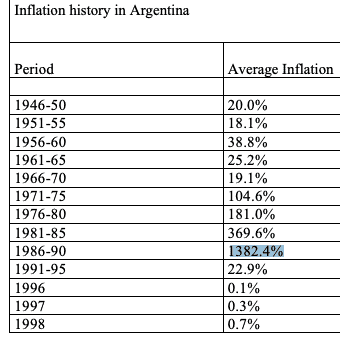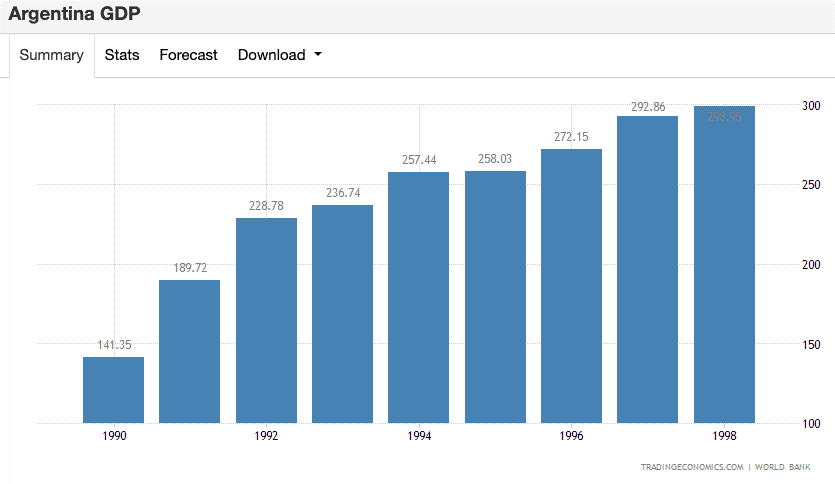It would have been a great mistake on our part not to give such an event the attention it deserves. After the presidential elections of 19 November 2023 in Argentina…
Freedom has won!
Last November freedom won, and with a historic lead in many Argentinean provinces! The Argentinean presidential candidate Javier Milei has won the elections by a margin of almost 12 points:
 La Libertad Avanza has won an impressive and ‘unexpected’ —although, given the circumstances, also logical given the situation Argentina has been in for decades.
La Libertad Avanza has won an impressive and ‘unexpected’ —although, given the circumstances, also logical given the situation Argentina has been in for decades.
As often happens in these cases, Argentines have also had to hit rock bottom in a desperate search for answers that can only be found in and through freedom. Unfortunately, it is often only out of pain and despair that the strength to begin a radical change is born.
No one wakes up overnight with an inflation rate of almost 143% and a poverty rate of 40%. Unfortunately, these data only show the tip of the iceberg of this country’s problems.

 Milei represents not only a brake on the expansionary policies of the Argentine state, but also a complete change of perspective. He has a great responsibility not only to the Argentine people, but also to all defenders of freedom around the world, like us.
Milei represents not only a brake on the expansionary policies of the Argentine state, but also a complete change of perspective. He has a great responsibility not only to the Argentine people, but also to all defenders of freedom around the world, like us.
The cards are on the table and Javier Milei now holds the reins of how freedom and individual rights are perceived and protected in society.
What is most fascinating about Argentina’s current situation is that the entire country (with the exception of its formidable national football team) is in deep crisis, making it an extremely interesting case study… and the world is watching closely. With Milei’s entry into government, Argentina offers a potential example of how the introduction of values of freedom and liberal reforms could turn things around. These developments could prove that a better future is possible if freedom is prioritised and liberal principles are applied… and it will be!
Who is Javier Milei and what does a libertarian stand for?
Javier Milei stands for the reconstruction of Argentina, promises to undo all the terrible and reprehensible acts committed by state and populist forces to make the most of the nation’s wealth, and champions responsible management based on the concepts of freedom, autonomy, non-interventionism, and moral justice. Milei wants to put an end to the country’s decline: Argentina was once the richest country in the world… and could be again.
We want to underline how important this election result is for Argentina, for the whole of Latin America, and also for the world, which is currently trying to impose (left-wing) dictatorships on all continents. And no, Javier is neither right-wing nor extreme right-wing: he is a libertarian and anarcho-capitalist —which is just a convoluted way of saying that the state does not (or should not) have any useful, moral or just role in people’s lives. He is just like us at Denationalize.me, which is why we think he deserves an article to congratulate him on his triumph.
Forcing a person to participate in an organisation, an agreement or a decision is unfair, wrong, unfeasible, immoral, unacceptable… you name it.
If someone tries to interfere in your life and you say “NO, THANK YOU: THAT’S NOT WHAT I WANT”, that is the end of the matter without further discussion (even if the person has the best intentions in the world and just wants to help you). The problem is that it does not work like that with the state: their response is always going to be “I do not care if you want it or not, and I do not care if you agree or not: I am going to run your life anyway”. The state forces you to obey under threat of fines, imprisonment, violence and even (in many countries) death.
The state (be it left-wing, right-wing, red, green, blue…) instead of organising, all it achieves is to disorganise and segregate through differences between citizens, to blame, to exclude and to sell privileges. It does not define ‘justice’ and what is right or wrong, but adapts it to its own needs for its own benefit (and not for yours, as it tries to make you believe).
Good ideas should not be forced: they are truly considered good when they are supported voluntarily by those who benefit from them. No one can decide freely under duress.
Since the state inevitably exists, the best strategy is to minimise its power. This is achieved by taking the initiative to implement appropriate reforms that focus on improving people’s quality of life. This seems to be the intention of Javier Milei, who aspires to the highest office of a nation to completely reform the public apparatus under libertarian approaches. His goal is to organise the state in such a way that it is no longer an obstacle to justice, progress, accountability, and the creation of added value. Naturally, this will also require certain concessions.
Libertarians are usually the ‘outsiders’, the ‘weirdos’, the ‘crazies’, the ‘radicals’, the ‘outliers’… do you think nobody criticises Denationalize.me? We have plenty of critics and haters who, instead of doing something useful or minding their own business, cause trouble on the internet and harm others.
What does Milei want to do?
Javier Milei’s aim is to stabilise the Argentine economy, probably through dollarisation and the dissolution of the central bank. This would be achieved by converting the monetary base from the Argentine peso to the US dollar —for which the central bank’s assets would play a key role. However, those in the know will know that ‘dollarisation’ is rather a deceptive programme that the global public can at least grasp —even if they do not really understand it. Indeed, Milei knows this and wants a currency competition like the one proposed by Nobel laureate Hayek himself. Bitcoin and other cryptocurrencies will play a key role in this process —although, naturally, the dollar will come out on top in such a competition.
In any case, there will no longer be any financial institution that forgives the mistakes of politicians: from now on they will be obliged to behave properly and take responsibility for the consequences of their ineptitude.
Moreover, Milei’s reform programme also includes job cuts in the public sector, the abolition of social benefits, comprehensive privatisation, and the liberalisation of the economy. His public appearances wielding chainsaws are the perfect representation of his political programme.
Milei aims to reduce poverty by increasing wealth through national development, rather than resorting to forced welfarism and redistribution. His plans for fiscal reform and drastic state retrenchment face opposition from established political and corporatist interest groups.
What Milei intends to do neutralises the state’s ability to create inflation and do irresponsible follies in which the Argentine people end up being the victims and inevitably pay the price.
Milei’s ideas are neither as ‘extreme’ nor as ‘crazy’ as they are being portrayed in the media. Dollarisation of the economy has already happened in the past. His ideas are based on the ‘Austrian School of Economics’.
History repeats itself: In the late 1980s, Argentina responded to budget deficits by printing money, which led to a monthly inflation rate of 20,000% and price regulation.
 The Argentine Currency Board was a monetary regime introduced in Argentina in the early 1990s to combat hyperinflation and stabilise the economy. This system pegged the value of the Argentine peso to the US dollar so that one peso was exactly equivalent to one dollar. The main function of the Currency Board was to guarantee the full convertibility of the peso into US dollars by hedging the peso’s money supply with sufficient foreign exchange reserves. This regime was intended to restore confidence in the currency and curb inflation in the only way possible: by limiting the central bank’s ability to print money unchecked… and it worked!
The Argentine Currency Board was a monetary regime introduced in Argentina in the early 1990s to combat hyperinflation and stabilise the economy. This system pegged the value of the Argentine peso to the US dollar so that one peso was exactly equivalent to one dollar. The main function of the Currency Board was to guarantee the full convertibility of the peso into US dollars by hedging the peso’s money supply with sufficient foreign exchange reserves. This regime was intended to restore confidence in the currency and curb inflation in the only way possible: by limiting the central bank’s ability to print money unchecked… and it worked!
It was the reforms to contain spending and economic openness to attract investment (preserving the currency is one of the biggest incentives for investment, as it protects purchasing power) that turned the situation around. Measures such as these also limit the government’s ability to say that it “needs more powers to save the nation” —to save it from the problems it itself has caused, of course.
These measures put the brakes on the national budget and force the government to take responsibility and push for positive reforms, something that electoral populism abhors to the death.
The document The Argentine Currency Board tells the whole story in detail and comes to the following conclusions:
- The origin of inflation in Argentina was closely linked to budget deficits. In other words: if prices seem high to you when you go shopping, it means that your purchasing power has decreased or that unemployment/difficulty in finding work has increased. In either case, it is entirely the fault of the government. In these situations, people tend to blame entrepreneurs or employers for rising costs, not realising that these price rises are often a direct response to rising operating costs, such as raw materials, energy costs or higher taxes. These problems may be due to economic policy decisions by governments, which are the root cause of inflation and thus price increases. Difficulty in finding work is usually because it is too expensive or difficult to hire someone because there are regulatory laws that ‘protect’ workers. These laws result in a high percentage of the population remaining unemployed, rather than employers and workers having the opportunity to agree on working conditions themselves. The minimum wage CREATES unemployment, as the people who would be paid the minimum wage are often the easiest to replace and the most in need of work, as they have skills that are less valued by the market. Government policy often puts these people out of work, as they are too expensive for employers. Instead of earning a little and being able to take food home, they earn nothing and are dependent on state benefits, financed by their own taxes.
 A key element of the reform process was the extensive reorganisation of the banking sector with the aim of improving its solvency and thus reducing the risks of a possible bailout. The banking crises of the late 1970s and early 1980s led to fiscal losses that analysts estimated at between 10 and 15% of GDP – WITH 0% INFLATION. In 1991, when the plan was implemented, Argentina’s GDP was $141 billion, and in 1998 it was $299 billion.
A key element of the reform process was the extensive reorganisation of the banking sector with the aim of improving its solvency and thus reducing the risks of a possible bailout. The banking crises of the late 1970s and early 1980s led to fiscal losses that analysts estimated at between 10 and 15% of GDP – WITH 0% INFLATION. In 1991, when the plan was implemented, Argentina’s GDP was $141 billion, and in 1998 it was $299 billion.
 Perhaps even more interesting was that the success of the convertibility plan was maintained even in times of major external turbulence such as the Mexican devaluation of 1994 (the so-called ‘Tequila Effect’), the East Asian crisis or the Russian default.
Perhaps even more interesting was that the success of the convertibility plan was maintained even in times of major external turbulence such as the Mexican devaluation of 1994 (the so-called ‘Tequila Effect’), the East Asian crisis or the Russian default.- The convertibility plan was Argentina’s most successful stabilisation programme. In only two years, inflation fell from 171% per year in 1991 to 10% in 1993, and to only 4.7% in 1994. No other stabilisation plan applied in a country suffering from chronic inflation had reduced the inflation rate so rapidly and sustainably to a level equivalent to the international standards.
- The Currency Board was a critical element of the policy package that took Argentina from having one of the highest inflation rates to one of the lowest in the world, allowing the country to return to high growth rates after two decades of stagnation, as well as introducing more stable rules that have led to record levels of foreign direct investment.
We are sure you were not taught this part of history in school.
After Carlos Menem left the government in 1999, Fernando de la Rúa came to power and went back to the old state ways. Guess what happened: indeed… man is the only animal that trips over the same stone twice. Monetary policy regulations, fiscal plans and spending controls are the great temptation of every politician (and, in turn, the great nightmare of his citizens). Instead of reaffirming a clear commitment to the nation, to reforms, to investors and to those who create value, Argentina resorted to populism and interest rate interventions, which triggered capital flight from the economy and started the decline for which Argentina is now famous. All the benefits of previous reforms went down the drain, and investments left the country (and even withdrawals from banks were halted, with the so-called corralitos). Let us get this straight: capital must be attracted to the country, not prevented from going elsewhere.
Governments should immediately stop portraying as enemies and evil those who do productive work, create jobs, contribute to progress, and provide goods and services.
Javier Milei faces the complex task of winning support for his most far-reaching reforms. His direct and decisive approach, which leaves little room for half measures and concessions, could make it difficult to build consensus in the political environment – especially in Parliament and in the Chamber of Deputies, where he does not enjoy a majority. Effective political leadership often requires negotiating skills and strategic thinking. In addition, Milei will have to forge new diplomatic relationships to push through his reform plans.
If he succeeds, many more libertarians will come to power in other countries around the world and statist populists will run cold with fear. In Brazil, a neighbouring country even bigger than Argentina, the young population is fed up with Lula’s communism. From Denationalize.me, we support Brazilian libertarian politics with donations, and everything points to the fact that, especially in the south of the country, it is possible that libertarian change will triumph in Brazil in the next decade.
The tax and residency situation today
Let us take a look at the current situation in Argentina, which will hopefully improve in the future thanks to Milei:
- Tax residency: anyone living in Argentina for more than 12 months is considered a tax resident as of the 13th month of stay. A permanently available home is not a decisive factor for tax liability. It is sufficient to leave the country for 3 months to be tax exempt for another 12 months. Under certain conditions, it is even possible to reside in Argentina for 5 years free of tax on income earned abroad. And with Milei… everything promises to be even more attractive!
- Visa requirements: 90 days for many nationalities. There are several relatively simple ways to immigrate permanently.
- Income tax: 5-35%.
- Corporate tax: 25-35%.
- VAT: normally 21%. Between 10.5 and 27%.
- Wealth tax: 0.5-1.75%.
- Inheritance and gift tax: only collected in Buenos Aires.
- Withholding tax: for profits such as dividends, 7 % is applied.
- Taxes on account debits and credits: 0.6%.
- Cryptocurrencies: cryptocurrencies are not explicitly mentioned in the law, which gives rise to different interpretations.
Did you know that birth tourism has increased in Argentina, especially among Russian citizens? This phenomenon, which consists of travelling to another country to give birth, allows the newborn to become a citizen of the country of birth. Argentina is one of the preferred destinations, as it offers simple procedures for residence permits and does not require a visa for Russian citizens. It is estimated that the number of Russians travelling to Argentina for this purpose could be as high as 10,000. All this is explained in more detail in our Denationalize.me Citizenship Encyclopedia.
Argentina is a very popular country for Perpetual Travellers. Its definition of tax residency makes it one of the easiest (if not the easiest) country in the world to stay much longer without running the risk of becoming a tax resident ‘against your will’.
Argentina’s breathtaking landscapes – from the vineyards of Mendoza to the glaciers of Tierra del Fuego – are testament to its wide and diverse beauty, stretching from the tropical north to the icy depths of Patagonia in the south: great beaches, vast pampas and high mountains make for an impressive natural diversity. Despite its political and economic problems, Argentina has always been Christoph’s favourite country, and he has already visited every single country in the world.
Christoph loves Argentina and he loves wine, so he decided to combine both passions:
 In the spring of 2021, Christoph started an investment (or rather an expensive hobby) that offers an exciting taste: premium wine from the Uco Valley, known as one of the best wine regions in Argentina. The production focuses on organic Malbec grapes of the highest quality. Christoph expects to produce about 2000 bottles per year, depending on the desired quality. The first tasting of the stateless wine, which promises to combine enjoyment and performance, took place in 2022; more than 1000 bottles have already been imported to Europe. Of course, Javier Milei will receive a consignment of our anarcho-libertarian wine as a gift from us 😉.
In the spring of 2021, Christoph started an investment (or rather an expensive hobby) that offers an exciting taste: premium wine from the Uco Valley, known as one of the best wine regions in Argentina. The production focuses on organic Malbec grapes of the highest quality. Christoph expects to produce about 2000 bottles per year, depending on the desired quality. The first tasting of the stateless wine, which promises to combine enjoyment and performance, took place in 2022; more than 1000 bottles have already been imported to Europe. Of course, Javier Milei will receive a consignment of our anarcho-libertarian wine as a gift from us 😉.
 A toast to freedom.
A toast to freedom.
Freedom is the only answer
Unfortunately, the shadow and influence of the state remains enormous.
The state, an eternal drag on the machinery of progress, is not, never was and never will be the true promoter or protagonist of economic growth. This is an indisputable truth that resonates throughout history. The vital forces of the market, fuelled by the fire of human innovation and entrepreneurial daring, form the backbone of growth and prosperity. It is in the dynamic symphony of free enterprise that the true pulse of progress lies, not in the rigid structures of government intervention. Let us never forget that economic growth sprouts and grows in the gardens of freedom and self-determination, far from the restrictive hands of coercive and unjust state control.
Milei’s victory is symbolic, historic, and shattering.
You do not have to be president of a country to have an idea of how good governance should work. At Denationalize.me, we support the free cities promoted by Dr. Titus Gebel, who has the same vision as we do: to create a prosperous and more efficient place than any state-run city through a new approach. The goal of the State is to maintain power through coercion, while the goals of private cities are prosperity, wealth, the creation of fair value, the defence of individual liberties, and the protection of private property.
While countries like Spain, Germany, France, Italy, etc. continue to decline, Argentina has put in charge a president willing to lead the country to prosperity. Who will now be the third-world country? Who will have the next national bankruptcy?
“No action can be considered virtuous unless it is freely executed.” Murray N. Rothbard
Goodbye (for now and hopefully for a long time) to Peronism and Kirchnerism: no more state interventionism, market distortion, severe inefficiencies, illiberal approaches, currency control, high taxes… and goodbye to much more bullshit!
Thank you, Javier, for being a standard-bearer of hope, a true symbol of resistance against the shadows of oppression and an intellectual with a profound knowledge of economics. Thank you for your struggle in defence of freedom!
Did you like our blog article?
Support us by purchasing our products and services. Or build up a passive income by recommending us as an affiliate! And don't forget to check out Christoph's travel blog christoph.today!
Secret Knowledge Video Course
Learn Everything that You Need to Know for a Life as a Perpetual Traveler
Watch Video CourseEncyclopedia Collection
Acquire Expansive Knowledge about Banking, Companies, Citizenships, and Emigration.
Order eBooks

 A key element of the reform process was the extensive reorganisation of the banking sector with the aim of improving its solvency and thus reducing the risks of a possible bailout. The banking crises of the late 1970s and early 1980s led to fiscal losses that analysts estimated at between 10 and 15% of GDP – WITH 0% INFLATION. In 1991, when the plan was implemented, Argentina’s GDP was $141 billion, and in 1998 it was $299 billion.
A key element of the reform process was the extensive reorganisation of the banking sector with the aim of improving its solvency and thus reducing the risks of a possible bailout. The banking crises of the late 1970s and early 1980s led to fiscal losses that analysts estimated at between 10 and 15% of GDP – WITH 0% INFLATION. In 1991, when the plan was implemented, Argentina’s GDP was $141 billion, and in 1998 it was $299 billion. Perhaps even more interesting was that the success of the convertibility plan was maintained even in times of major external turbulence such as the Mexican devaluation of 1994 (the so-called ‘Tequila Effect’), the East Asian crisis or the Russian default.
Perhaps even more interesting was that the success of the convertibility plan was maintained even in times of major external turbulence such as the Mexican devaluation of 1994 (the so-called ‘Tequila Effect’), the East Asian crisis or the Russian default.




